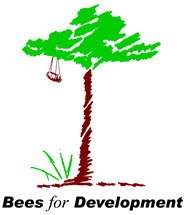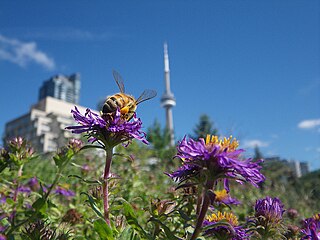
Honey is a sweet and viscous substance made by several bees, the best-known of which are honey bees. Honey is made and stored to nourish bee colonies. Bees produce honey by gathering and then refining the sugary secretions of plants or the secretions of other insects, like the honeydew of aphids. This refinement takes place both within individual bees, through regurgitation and enzymatic activity, and during storage in the hive, through water evaporation that concentrates the honey's sugars until it is thick and viscous.

A beehive is an enclosed structure in which some honey bee species of the subgenus Apis live and raise their young. Though the word beehive is used to describe the nest of any bee colony, scientific and professional literature distinguishes nest from hive. Nest is used to discuss colonies that house themselves in natural or artificial cavities or are hanging and exposed. The term hive is used to describe an artificial/man-made structure to house a honey bee nest. Several species of Apis live in colonies. But for honey production, the western honey bee and the eastern honey bee are the main species kept in hives.

A beekeeper is a person who keeps honey bees, a profession known as beekeeping.

Beekeeping is the maintenance of bee colonies, commonly in man-made beehives. Honey bees in the genus Apis are the most commonly kept species but other honey producing bees such as Melipona stingless bees are also kept. Beekeepers keep bees to collect honey and other products of the hive: beeswax, propolis, bee pollen, and royal jelly. Other sources of beekeeping income include pollination of crops, raising queens, and production of package bees for sale. Bee hives are kept in an apiary or "bee yard".

An apiary is a location where beehives of honey bees are kept. Apiaries come in many sizes and can be rural or urban depending on the honey production operation. Furthermore, an apiary may refer to a hobbyist's hives or those used for commercial or educational usage. It can also be a wall-less, roofed structure, similar to a gazebo which houses hives, or an enclosed structure with an opening that directs the flight path of the bees.
Natural Resources Conservation Service (NRCS), formerly known as the Soil Conservation Service (SCS), is an agency of the United States Department of Agriculture (USDA) that provides technical assistance to farmers and other private landowners and managers.
In the United States, a commodity checkoff program promotes and provides research and information for a particular agricultural commodity without reference to specific producers or brands. It collects funds through a checkoff mechanism that is sometimes called checkoff dollars, from producers of a particular agricultural commodity and uses these funds to promote and do research on that particular commodity. As stated earlier the organizations must promote their commodity in a generic way without reference to a particular producer. Checkoff programs attempt to improve the market position of the covered commodity by expanding markets, increasing demand, and developing new uses and markets. Checkoff programs amount to $750 million per year.

Stephen Taber III. was an American apiologist, noted authority and author in the field of artificial insemination of queen bees for the purpose of developing disease resistant and gentle bee colonies.

Everett Franklin Phillips (1878-1951) was an American apiculturist, scholar, and innovator in the beekeeping field.

Commercial Beekeeping in the United States dates back to the 1860s.

Colony collapse disorder (CCD) is an abnormal phenomenon that occurs when the majority of worker bees in a honey bee colony disappear, leaving behind a queen, plenty of food, and a few nurse bees to care for the remaining immature bees. While such disappearances have occurred sporadically throughout the history of apiculture, and have been known by various names, the syndrome was renamed colony collapse disorder in early 2007 in conjunction with a drastic rise in reports of disappearances of western honey bee colonies in North America. Beekeepers in most European countries had observed a similar phenomenon since 1998, especially in Southern and Western Europe; the Northern Ireland Assembly received reports of a decline greater than 50%. The phenomenon became more global when it affected some Asian and African countries as well.
The National Pork Board is a program sponsored by the United States Department of Agriculture Agricultural Marketing Service whose purpose is to provide consumer information, perform industry-related research, and promote pork as a food product. The board's activities are funded by a mandatory commodity checkoff program, which requires hog producers to pay a small percentage-based fee each time an animal is sold.
Beekeeping in the United Kingdom is the maintenance of bee colonies by humans within the United Kingdom. It is a significant commercial activity that provides those involved with honey, beeswax, royal jelly, queen bees, propolis, flower pollen and bee pollen. Honeybees also provide pollination services to orchards and a variety of seed crops.

Bees for Development is an international charity working to alleviate poverty through beekeeping. Beekeeping contributes to supporting sustainable livelihoods in poor and remote communities; honey bees provide an essential ecosystem service. Bees for Development currently runs projects in Uganda, Zanzibar, Ethiopia and Kyrgyzstan. Its offices are in Monmouth, South Wales.

Urban beekeeping is the practice of keeping bee colonies (hives) in towns and cities. It is also referred to as hobby beekeeping or backyard beekeeping. Bees from city apiaries are said to be "healthier and more productive than their country cousins". As pollinators, bees also provide environmental and economic benefits to cities. They are essential in the growth of crops and flowers.

National Honey Bee Day is an awareness day when beekeepers, beekeeping clubs and associations, and honey bee enthusiasts from across the United States celebrate honey bees and recognize their contribution to humans' everyday lives as a means of protecting this critical species. National Honey Bee Day also pays homage to beekeepers, whose labors ensure there are well-managed, healthy bees to pollinate crops.

A Honey Queen Program is a local, state, or national program which annually selects young women to become the spokespeople for the honey and beekeeping industries in the area, state, or region. The national program, the American Honey Queen Program, is facilitated through the sponsorship of the American Beekeeping Federation and involves a lengthy competition, the winners of which travel around the United States and beyond promoting the honey and beekeeping industries and educating the public on the importance of honey bees, beekeeping, and honey.

The National Processed Raspberry Council is a U.S. organization that promotes and researches processed raspberries. It is part of a commodity checkoff program overseen by the U.S. Department of Agriculture.

Beekeeping in India has been mentioned in ancient Vedas and Buddhist scriptures. Rock paintings of Mesolithic era found in Madhya Pradesh depict honey collection activities. Scientific methods of beekeeping, however, started only in the late 19th century, although records of taming honeybees and using in warfare are seen in the early 19th century. After Indian independence, beekeeping was promoted through various rural developmental programs. Five species of bees that are commercially important for natural honey and beeswax production are found in India.

Savannah Bee Company is an American company based in Savannah, Georgia and founded by Ted Dennard in 2002. The company sells honey-related products and books, beauty products, beverages, and candles. The Savannah Bee Company has 15 locations in the United States.















